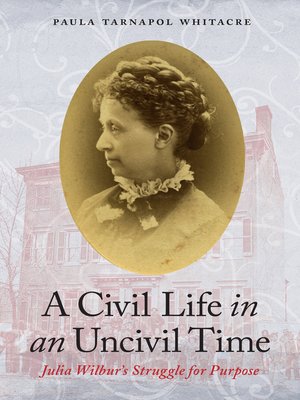A Civil Life in an Uncivil Time
ebook ∣ Julia Wilbur's Struggle for Purpose
By Paula Tarnapol Whitacre

Sign up to save your library
With an OverDrive account, you can save your favorite libraries for at-a-glance information about availability. Find out more about OverDrive accounts.
Find this title in Libby, the library reading app by OverDrive.



Search for a digital library with this title
Title found at these libraries:
| Library Name | Distance |
|---|---|
| Loading... |
In the fall of 1862 Julia Wilbur left her family's farm near Rochester, New York, and boarded a train to Washington, DC. As an ardent abolitionist, the forty-seven-year-old Wilbur left a sad but stable life, headed toward the chaos of the Civil War, and spent the next several years in Alexandria, Virginia, devising ways to aid recently escaped slaves and hospitalized Union soldiers. A Civil Life in an Uncivil Time shapes Wilbur's diaries and other primary sources into a historical narrative of a woman who was alternately brave, self-pitying, foresighted, and myopic.
Paula Tarnapol Whitacre describes Wilbur's experiences against the backdrop of Alexandria, a southern town held by the Union from 1861 to 1865; of Washington, DC, where Wilbur became active in the women's suffrage movement; and of Rochester, New York, where she began a lifelong association with Frederick Douglass and Susan B. Anthony.
Harriet Jacobs, author of Incidents of a Slave Girl, became Wilbur's friend and ally. Together, the two women, black and white, fought social convention to improve the lives of African Americans escaping slavery by coming across Union lines. In doing so, they faced the challenge to achieve racial and gender equality that continues today.
A Civil Life in an Uncivil Time is the captivating story of a woman who remade herself at midlife during a period of massive social upheaval.
Paula Tarnapol Whitacre describes Wilbur's experiences against the backdrop of Alexandria, a southern town held by the Union from 1861 to 1865; of Washington, DC, where Wilbur became active in the women's suffrage movement; and of Rochester, New York, where she began a lifelong association with Frederick Douglass and Susan B. Anthony.
Harriet Jacobs, author of Incidents of a Slave Girl, became Wilbur's friend and ally. Together, the two women, black and white, fought social convention to improve the lives of African Americans escaping slavery by coming across Union lines. In doing so, they faced the challenge to achieve racial and gender equality that continues today.
A Civil Life in an Uncivil Time is the captivating story of a woman who remade herself at midlife during a period of massive social upheaval.







